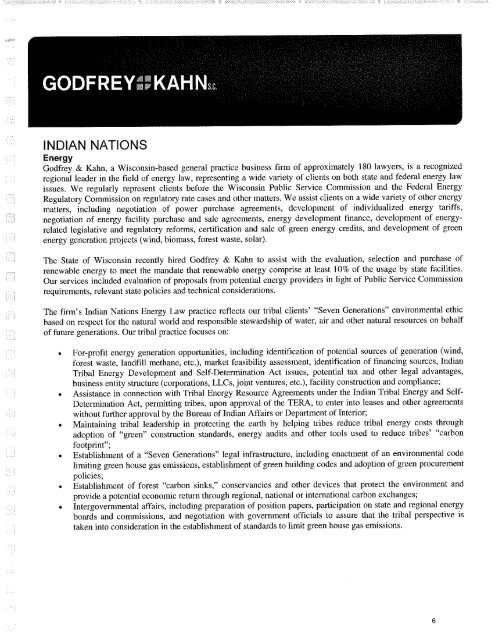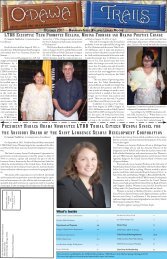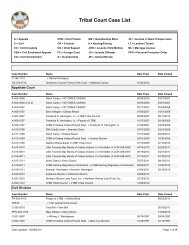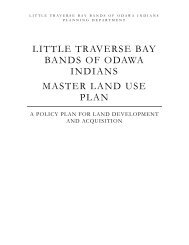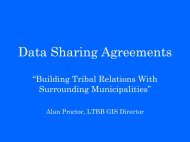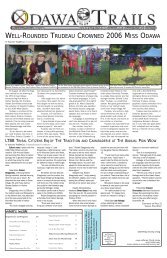United Tribes ) Michigan - Little Traverse Bay Bands of Odawa Indians
United Tribes ) Michigan - Little Traverse Bay Bands of Odawa Indians
United Tribes ) Michigan - Little Traverse Bay Bands of Odawa Indians
You also want an ePaper? Increase the reach of your titles
YUMPU automatically turns print PDFs into web optimized ePapers that Google loves.
INDIAN NATIONS<br />
Energy<br />
Godfrey & Kahn, a Wisconsin-based general practice business firm <strong>of</strong> approximately 180 lawyers, is a recognized<br />
regional leader in the field <strong>of</strong> energy law, representing a wide variety <strong>of</strong> clients on both state and federal energy law<br />
issues. We regularly represent clients before the Wisconsin Public Service Commission and the Federal Energy<br />
Regulatory Commission on regulatory rate cases and other matters. We assist clients on a wide variety <strong>of</strong> other energy<br />
matters, including negotiation <strong>of</strong> power purchase agreements, development <strong>of</strong> individualized energy tariffs,<br />
negotiation <strong>of</strong> energy facility purchase and sale agreements, energy development finance, development <strong>of</strong> energyrelated<br />
legislative and regulatory reforms, certification and sale <strong>of</strong> green energy credits, and development <strong>of</strong> green<br />
energy generation projects (wind, biomass, forest waste, solar).<br />
The State <strong>of</strong> Wisconsin recently hired Godfrey & Kahn to assist with the evaluation, selection and purchase <strong>of</strong><br />
renewable energy to meet the mandate that renewable energy comprise at least 10% <strong>of</strong> the usage by state facilities.<br />
Our services included evaluation <strong>of</strong> proposals from potential energy providers in light <strong>of</strong> Public Service Commission<br />
requirements, relevant state policies and technical considerations.<br />
The firm's Indian Nations Energy Law practice reflects our tribal clients' "Seven Generations" environmental ethic<br />
based on respect for the natural world and responsible stewardship <strong>of</strong> water, air and other natural resources on behalf<br />
<strong>of</strong> future generations. Our tribal practice focuses on:<br />
• For-pr<strong>of</strong>it energy generation opportunities, including identification <strong>of</strong> potential sources <strong>of</strong> generation (wind,<br />
forest waste, landfill methane, etc.), market feasibility assessment, identification <strong>of</strong> financing sources, Indian<br />
Tribal Energy Development and Self-Determination Act issues, potential tax and other legal advantages,<br />
business entity structure (corporations, LLCs, joint ventures, etc.), facility construction and compliance;<br />
• Assistance in connection with Tribal Energy Resource Agreements under the Indian Tribal Energy and Self-<br />
Determination Act, permitting tribes, upon approval <strong>of</strong> the TERA, to enter into leases and other agreements<br />
without further approval by the Bureau <strong>of</strong> Indian Affairs or Department <strong>of</strong> Interior;<br />
• Maintaining tribal leadership in protecting the earth by helping tribes reduce tribal energy costs through<br />
adoption <strong>of</strong> "green" construction standards, energy audits and other tools used to reduce tribes' "carbon<br />
footprint";<br />
• Establishment <strong>of</strong> a "Seven Generations" legal infrastructure, including enactment <strong>of</strong> an environmental code<br />
limiting green house gas emissions, establishment <strong>of</strong> green building codes and adoption <strong>of</strong> green procurement<br />
policies;<br />
• Establishment <strong>of</strong> forest "carbon sinks," conservancies and other devices that protect the environment and<br />
provide a potential economic return through regional, national or international carbon exchanges;<br />
• Intergovernmental affairs, including preparation <strong>of</strong> position papers, participation on state and regional energy<br />
boards and commissions, and negotiation with government <strong>of</strong>ficials to assure that the tribal perspective is<br />
taken into consideration in the establishment <strong>of</strong> standards to limit green house gas emissions.<br />
6


